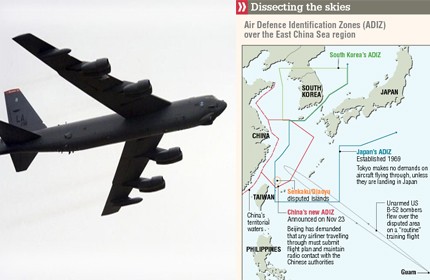US, Japan planes defy China's defence zone

TOKYO - Two unarmed United States B-52 bombers on a training mission flew over disputed islands in the East China Sea without informing Beijing, while Japan's main airlines also ignored the Chinese authorities when their planes passed through a new airspace defence zone Wednesday.
The defiance from Japan and its ally, the US, raises the stakes in a territorial stand-off between Beijing and Tokyo over the islands and challenges China to make the next move, experts said.
China published coordinates for an East China Sea Air Defence Identification Zone over the weekend and warned that it would take "defensive emergency measures" against aircraft that failed to identify themselves properly in the airspace. The zone is about two thirds the size of Britain.
"If the US conducts two or three more flights like this, China will be forced to respond. If China can respond only verbally, it would be humiliating," said Prof Sun Zhe, a professor at the Center for US-China Relations at Tsinghua University in Beijing.
"Japan and the US don't want to be forced into a position where they are paper tigers. China is even less eager to be a paper tiger."
China's Defence Ministry said it had monitored the entire progress of the US bombers through the zone on Tuesday.
A Pentagon spokesman said the planes had neither been observed nor contacted by Chinese aircraft.
Following a request from the Japanese government, Japan Airlines (JAL) and ANA Holdings said they stopped giving flight plans and other information to the Chinese authorities Wednesday. Neither airline had experienced any problems when passing through the zone, they added.
Japan's aviation-industry association said it had concluded that there was no threat to passenger safety by ignoring the Chinese demands, JAL said.
The flight by the B-52 bombers was part of a long-planned exercise, a US military official said.
But Beijing may have been caught off-guard and could change its approach, said Mr Dean Cheng, an analyst at the conservative Heritage Foundation, a Washington-based think-tank.
He said: "The fact that Washington responded so strongly sends a very clear challenge back to Beijing, saying: 'Look, in case you were wondering, we are serious when we say we are an ally of Japan. And do not mess with that.'"

Get My Paper for more stories.